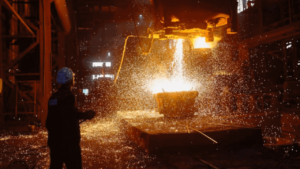
US exchange-traded funds (ETFs) investing in Bitcoin have faced an outflow of $3.5 billion in investor funds since the beginning of this month, according to Bloomberg calculations. The record outflow in a single month was set in February this year and amounted to $3.6 billion. With one week left in November, this record could be broken.
In particular, investors withdrew $2.2 billion from the largest Bitcoin ETF, IBIT, managed by BlackRock.
The price of Bitcoin fell 2.6% on Monday to $85,700. Since the beginning of the year, the cryptocurrency has fallen in price by about 7%.
Citi Research analysts note that the outflow of funds from ETFs exacerbates the negative dynamics of the cryptocurrency, while the inflow of funds accelerates its growth. According to their calculations, an outflow of $1 billion from funds investing in Bitcoin leads to a 3.4% decline in the value of Bitcoin itself, and vice versa.

Global steel production in October 2025 decreased by 5.9% compared to October 2024, to 143.340 million tons, with declines recorded in most of the top ten producing countries, according to data from the World Steel Association (Worldsteel).
The top ten countries in terms of steel production in October 2025 are as follows:
China – 72 million tons (down 12.1% compared to October 2024);
India – 13.563 million tons (up 5.9%);
USA – 6.989 million tons (up 9.4%);
Japan – 6.853 million tons (down 1%);
Russia – 5.250 million tons (down 6.2%);
South Korea – 5.093 million tons (down 5.8%);
Iran – 3.316 million tons (up 12%);
Turkey – 3.208 million tons (up 3.1%);
Germany – 3.127 million tons (down 3%);
Brazil – 2.988 million tons (down 2.7%).
In January-October 2025, global steel production decreased by 2.1% compared to the same period in 2024, to 1 billion 517.589 million tons. The top ten producing countries for the first ten months of this year are:
China – 817.870 million tons (down 3.9% compared to January-October 2024);
India – 135.987 million tons (up 10%);
USA – 68.376 million tons (up 2.8%);
Japan – 67.327 million tons (down 4.1%);
Russia – 56.536 million tons (down 4.9%);
South Korea – 51.144 million tons (down 3.6%);
Turkey – 31.277 million tons (up 1.2%);
Germany – 28.505 million tons (down 9.9%);
Brazil – 27.988 million tons (down 1.8%);
Iran – 25.442 million tons (down 1%).
At the end of 2024, 71 countries produced 1 billion 839.449 million tons of steel, which is 0.9% less than in 2023. The leaders were China – 1 billion 5.090 million tons (down 1.7%), India – 149.587 million tons (up 6.3%), Japan – 84.009 million tons (down 3.4%), the United States – 79.452 million tons (down 2.4%), Russia – 70.690 million tons (down 7%), South Korea – 63.531 million tons (down 4.7%), Germany – 37.234 million tons (up 5.2%), Turkey – 36.893 million tons (up 9.4%), Brazil – 33.741 million tons (up 5.3%), and Iran – 30.952 million tons (up 0.8%).
In 2023, 71 countries produced 1 billion 849.734 million tons of steel (down 0.1% from 2022), and in 2022, 64 countries produced 1 billion 831.467 million tons (down 4.3% from 2021), with China continuing to dominate and production growing in India amid declining performance in most developed economies.
Earlier, the Experts Club analytical center released a video analysis of the world’s leading steel producers from 2001 to 2024 – https://youtube.com/shorts/VgUU9MEMosE?si=c5yD04gmNtJoFblB

In October 2025, Ukrainian metallurgical companies increased steel production by 7.3% compared to October 2024, from 604,000 tons to 648,000 tons, but reduced it by 5.9% compared to September 2025 (689 thousand tons), according to data from the World Steel Association (Worldsteel).
According to the association’s report, Ukraine ranked 21st among 70 steel-producing countries in October.
In January-October 2025, Ukrainian steel companies produced 6.172 million tons of steel, which is 4.9% less than in the same period of 2024 (6.487 million tons). Ukraine ranks 22nd in the world in terms of this indicator.
In 2024, Ukraine produced 7.575 million tons of steel, increasing production by 21.6% compared to 2023 (6.228 million tons) and ranked 20th among 71 countries. In 2023, steel production in the country decreased by 0.6% compared to 2022, to 6.228 million tons, and Ukraine ranked 22nd in the global ranking.
At the end of 2022, Ukraine produced 6.263 million tons of steel, which is 70.7% less than in 2021, and ranked 23rd among 64 countries covered by Worldsteel.
Earlier, the Experts Club analytical center released a video analysis of the world’s leading steel producers from 2001 to 2024 – https://youtube.com/shorts/VgUU9MEMosE?si=c5yD04gmNtJoFblB

Ingulets Mining and Processing Plant (Ingulets, Kryvyi Rih, Dnipropetrovsk region), part of the Metinvest Group, increased its net loss by 14.8 times to UAH 1 billion 489.657 million in January-September this year, compared to UAH 100.479 million in the same period last year.
According to the company’s interim report, which is available to the Interfax-Ukraine agency, the loss in the third quarter amounted to UAH 631.343 million.
In the first nine months of this year, the company’s revenue fell sharply due to downtime, to UAH 25.453 million from UAH 7 billion 793.635 million.
Undistributed profit at the end of September 2025 amounted to UAH 12 billion 200.491 million.
The main factors influencing this were restrictions on demand, including due to the loss of metallurgical plants in eastern Ukraine, logistical complications, a decline in sales prices, and the suspension of the concentrate production cycle in the second half of 2024 due to the lack of organizational and technical conditions for the company’s economic activities in wartime.
There was no commercial concentrate production in the first nine months of 2025. In the second quarter of 2025, the technological process was partially resumed as part of ore mining for shipment to the Central Mining and Processing Plant. In the third quarter of 2025, the work was extended.
Ore production for the first nine months of 2025 amounted to 86,745 thousand tons.
Ingulets GOK ended 2024 with a net loss of UAH 1 billion 317.997 million, compared to UAH 167.236 million in 2023. The plant ended 2022 with a net loss of UAH 851.259 million, while in 2021 it received UAH 20 billion 446.101 million in net profit. In 2020, Ingulets GOK reduced its net profit by 75.3% compared to the previous year, to UAH 1.5 billion.
The company specializes in the extraction and processing of iron-bearing quartzites from the Ingulets deposit, located in the southern part of the Kryvyi Rih iron ore basin. It produces iron ore concentrate. The company’s production capacity is 14 million tons of iron ore concentrate per year.
Metіnvest B.V. (Netherlands) owns 100% of the shares of PJSC “Ingulets GOK”.
The authorized capital of PJSC “Ingulets GOK” is UAH 689.906 million, with a share par value of UAH 0.25.
Ingulets GOK is part of the Metinvest Group, whose main shareholders are PJSC System Capital Management (SCM, Donetsk, 71.24%) and the Smart Holding group of companies (23.76%). The managing company of the Metinvest Group is Metinvest Holding LLC.

Almost all member companies of the European Business Association (EBA) complain about a shortage of personnel: 74% consider this problem to be significant, 21% report a partial shortage, and only 5% did not experience a shortage of personnel in 2025, according to a study of the Ukrainian labor market by the EBA.
“It is most difficult to fill vacancies for workers and technical specialists due to staff turnover and low motivation to work offline. There is also an acute shortage of narrow-profile specialists with knowledge of English, who are needed by international companies,” according to the results of the study published by the association’s press service.
It is emphasized that, in addition to them, it is difficult to find sales managers and middle managers, as their work requires constant presence, and booking opportunities are limited.
In addition, 46% of companies noted that the departure of young professionals aged 18-22 had a definite or significant impact on their activities. 42% did not feel any impact, while 12% noted that they did not yet have enough data to assess the situation.
In addition to the labor shortage, key trends in the labor market include inflated salary expectations on the part of candidates, the impact of mobilization, difficulties in booking workers, and staff turnover.
Among the companies surveyed, 46% noted that all employees are currently working from within Ukraine, compared to 35% of companies last year. At the same time, 47% have up to 10% of employees working from abroad, and only 5% of companies have more than 10% of such employees. The rest (approximately 2%) do not have accurate information.
Most employers (63%) do not plan to require employees to return to the office in the near future, 37% are considering this possibility, but 12% of them do not plan to bring back all categories of employees.
As for companies’ plans, most have a clear vision for development in 2026.
“The main focus of business is on increasing salary levels – this is planned by 94% of companies. In particular, 28% of companies anticipate growth in the range of 11-15%, 23% – 5-10%, 10% expect growth of 16-20%, and 6% of companies do not intend to raise salaries in 2026,” according to the EBA.
As for other plans, 36% intend to increase the number of employees next year, 55% do not plan any changes, and 9% plan to reduce their workforce. 17% of companies reported a redistribution of functions towards multifunctionality.
During 2025, most companies (83%) actively recruited new employees. Another 3% opened vacancies exclusively for internal candidates, and only 14% of respondents did not change their headcount.
In addition, 25% are planning to increase their budgets for staff training and development, 18% of respondents are planning to enter new markets and search for partners, 6% may change management or open new regional offices, 5% will reduce training costs in 2026, and 3% are planning to close offices.
The survey was conducted from October 2 to November 1, 2025, with 126 human resources professionals participating (41% department heads, 33% middle managers, 22% top management, and 4% junior staff). Among the respondents, 56% represent large businesses, 32% represent medium-sized businesses, and 12% represent small businesses. 58% of companies are international, and 42% are Ukrainian.